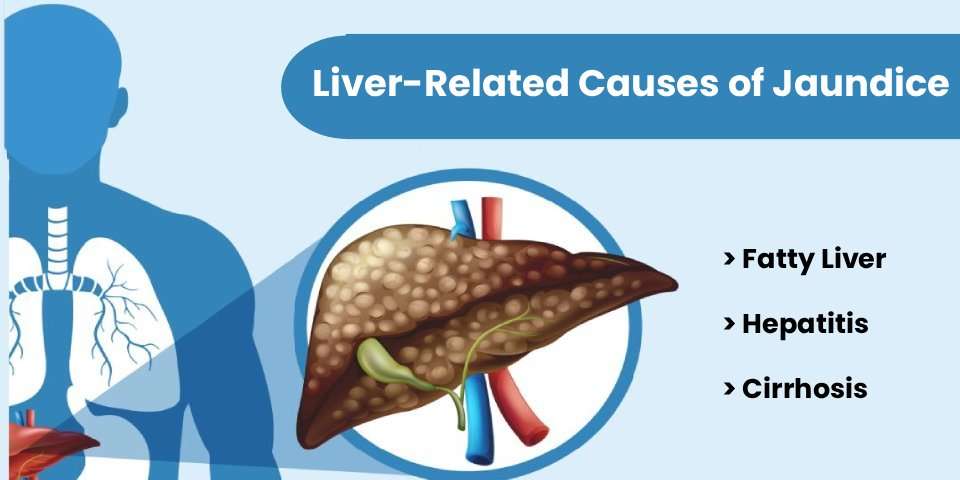
- August 19, 2025
- Dr. Vikrant Kale
- 0 Comments
- Latest Blogs
Liver-Related Causes of Jaundice: Fatty Liver, Hepatitis, Cirrhosis
Jaundice, characterized by the yellowing of skin and eyes, is often a telltale sign of liver problems that shouldn’t be ignored. When the liver struggles to process bilirubin properly, this yellow pigment accumulates in the body, creating the distinctive golden hue we associate with jaundice. Understanding the liver-related causes behind this condition can help you recognize when it’s time to consult a healthcare professional in your area.
Understanding Jaundice - Why Does Your Skin Turn Yellow?
Jaundice happens when too much bilirubin builds up in your bloodstream. Bilirubin is a yellow substance that your body naturally produces when it breaks down old, worn-out red blood cells. Normally, your liver acts like a sophisticated filtration system, processing this bilirubin and eliminating it through bile. However, when liver function becomes compromised due to various conditions, bilirubin builds up, causing that characteristic yellow discoloration. The condition manifests not just in skin color changes but also through yellowing of the whites of your eyes, dark urine, and pale-colored stools. Many people initially notice these changes during their daily routine – perhaps while looking in the bathroom mirror or when family members point out the unusual coloring.
Fatty Liver Disease - Too Much Fat on Your Liver:
Today, many people are developing fatty liver problems even when they don’t drink alcohol much. This condition, called NAFLD, is spreading because of how we live today – with less exercise and more processed foods. This condition occurs when fat accumulates in liver cells, even in people who drink little to no alcohol. The busy urban lifestyle in cities like Pune, with its fast food culture and sedentary work habits, contributes significantly to this growing health concern.
Fatty liver disease often develops silently, with many people unaware they have it until routine blood tests reveal elevated liver enzymes. As the condition progresses, it can lead to inflammation and eventually jaundice. A qualified hepatologist in Pune can help diagnose this condition through specialized tests and imaging studies. The good news is that early-stage fatty liver disease is often reversible through lifestyle modifications. Simple changes like incorporating regular exercise, reducing processed foods, and maintaining a healthy weight can significantly improve liver function and prevent progression to more serious conditions.
Hepatitis - When Your Liver Gets Swollen:
Hepatitis, literally meaning “liver inflammation,” represents one of the most common causes of liver-related jaundice. This condition can result from viral infections (Hepatitis A, B, C), autoimmune disorders, or toxic substances including certain medications and alcohol. Viral hepatitis often presents with jaundice as one of its primary symptoms. Hepatitis A, commonly spread through contaminated food and water, typically causes acute but temporary liver inflammation. Meanwhile, Hepatitis B and C can lead to chronic conditions requiring long-term management by an experienced gastroenterologist and liver doctor. Many patients describe feeling unusually fatigued before noticing the yellowing of their skin. Other common symptoms include loss of appetite, nausea, and abdominal discomfort. Early detection and proper treatment are crucial for preventing complications and ensuring the best possible outcomes.
Cirrhosis - The Advanced Stage:
Cirrhosis represents the most serious liver-related cause of jaundice, occurring when healthy liver tissue becomes replaced by scar tissue. This irreversible condition typically develops over years or decades, often as the end result of chronic hepatitis, alcoholic liver disease, or non-alcoholic fatty liver disease. When cirrhosis develops, the liver loses its ability to perform essential functions, including bilirubin processing. This leads to persistent jaundice along with other serious complications like fluid accumulation in the abdomen, confusion due to toxin buildup, and bleeding problems. Living with cirrhosis requires comprehensive medical management and regular monitoring. A specialized liver treatment center can provide the multidisciplinary care needed to manage symptoms, prevent complications, and optimize quality of life.
Protecting Your Liver - Simple Steps to Reduce Risk:
Maintaining liver health can prevent many causes of jaundice. Some practical measures include:
- Following a balanced diet rich in fresh fruits, vegetables, and whole grains
- Limiting alcohol intake and avoiding harmful substances
- Staying physically active to reduce fatty liver risk
- Getting vaccinated against hepatitis A and B
- Scheduling regular liver function check-ups
Incorporating these habits can help safeguard your liver and reduce the risk of serious liver conditions.
When to Seek Professional Help:
Recognizing when to consult a healthcare professional is crucial for anyone experiencing potential signs of liver problems. If you notice yellowing of your skin or eyes, dark urine, persistent fatigue, or abdominal pain, it’s important to seek medical evaluation promptly. Dr. Vikrant Kale, a renowned liver specialist in Pune and hepatologist in Pune with over 17 years of experience, emphasizes the importance of early diagnosis in liver conditions. Based in Wakad, Pune, Dr. Vikrant Kale combines his expertise as a consultant gastroenterologist and hepatologist to provide comprehensive care for patients with liver-related jaundice.
At Dr. Kale Gastro Clinic, patients receive thorough evaluation using advanced diagnostic techniques including specialized blood tests, imaging studies, & when necessary, liver biopsy procedures. Getting early medical advice is always better than waiting. Book an appointment with Dr. Vikrant Kale today to get proper diagnosis, the right treatment, & helpful tips to keep your liver healthy for years to come.

